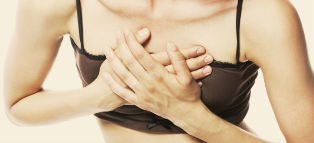If sore breasts and in the back, most likely you are having problems with the internal organs located in the chest, either with the spine. If you are from this area previously were injuries, such as rib fractures, a bruised chest, an injury of the spine, then from time to time appearing pain, can be their result.
Happens and so that the pain is bothering a person for a long time, and analgesics provide only temporary relief, in this case, most likely it is a chronic or progressive disease, requiring immediate treatment. We will look at some of the disease, the symptoms of which is pain in the chest, gives in the back.
If sore breasts and gives in the back: possible causes

Organs in the chest are placed sufficiently close to each other, and the feelings of pain, arising in one organ can spread to the next, put on different parts of the body, for example in the lower part of the back, in arm, in the throat, in the stomach. Sometimes chest pain, they give in the back, it happens in the following diseases:
1 reason - the Problems with the skeleton
Problems with the skeleton, and this is the reason, curvature of the spine, such as scoliosis, lordosis and kyphosis. All are in the later stages are accompanied by not only the visible defects, such as, for example, the asymmetry in the waist area, shoulder blades and shoulders in the scoliosis, so the pain sensations. Usually the pain arises in the chest, gives in the back, sometimes in one hand or on the neck, a person trying to make a more comfortable position, as usual, distorting the spine. When the curvature of the spine long correcting a person loses the ability to be in the correct position: with a straight back, symmetrical shoulders, without deflections in the lumbar and thoracic region, and with each passing year the situation only worsens. Also, pain in the chest, gives in the back can be caused by inflammation of the rib cartilage, or how to even called this disease – a disease Tietze. When her in the place of transition of cartilage (costal) in the breast bone is formed by the seal, a painful swelling. When the pressure on him, the pain will worsen, as well as when coughing and laughing. Most often, pain in the chest gives in the back, especially when changing body position.
2 reason - Diseases of the digestive system
Diseases of the digestive tract may be accompanied by pain in the chest, which gives in the back. Especially it is typical for a developing cholecystitis, if left untreated, there is a sharp pain arises in the chest, extending to the back and wearing the belt for the character, the later occurs the nausea and the body temperature rises, which is accompanied by a fever. Spasm of the esophagus, it causes pain in the chest, gives in the back. When the painful feelings are crushing in nature, and their occurrence is associated with food intake. In some tumor diseases of the digestive system occurred to the pain in the chest, gives in the back, here is a very important as soon as possible to make the diagnosis and start treatment. Unfortunately, in oncological diseases of the digestive organs, the pain most often arises when the tumor had metastasized to a large size.
3 cause - Disease of the heart and blood vessels
For a heart attack, angina pectoris (a condition that is born due to lack of blood supply to the heart muscle) is a typical sharp pain in the chest, gives in the back. When the feelings of pain are concentrated on the left side of the body and are accompanied by a pompous, lack of air and the feeling of fear. Most often, angina pectoris occurs due to excessive physical activities in a group of untrained people, often in older age. Also, if the pain in the chest, gives in the back, it can be a symptom of a serious disease, and massive pulmonary embolism. When this disease occurs the blockage of the gaps of the pulmonary arteries, which arises from oxygen insufficiency. When a fit person is not enough air, he feels a sharp pain in the chest, gives in the back, and the breathing becomes frequent and superficial.
If the pain on the chest gives in the back, and bothers you often enough, then it makes sense to undergo an examination, especially if it is accompanied by these symptoms such as lack of air, fainting, or signs of problems from the gastrointestinal tract.

























